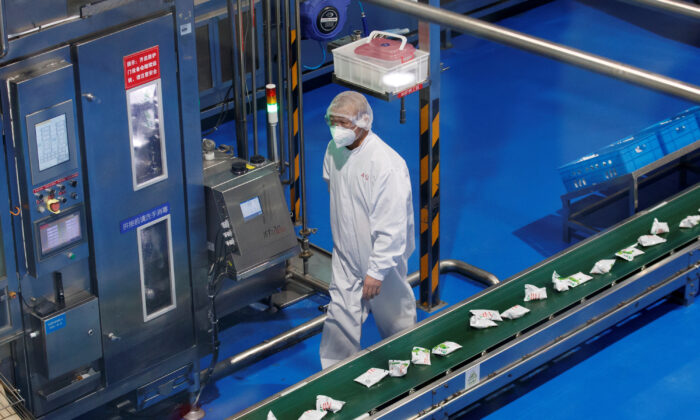Bank of America ‘Already Seeing Evidence’ of Coronavirus Economic Impact
BEIJING鈥擳he spread of the coronavirus in South Korea and Japan could mean a second wave of disruption at Chinese factories after the disease triggered a record contraction in activity last month.
Cases of the flu-like outbreak have jumped in South Korea and Japan, prompting some manufacturers there to partially suspend operations and risking a reduction in the supply of spare parts to factories in China as they restart work.
Chinese authorities have eased some travel restrictions and enabled some businesses to reopen.
But imports from South Korea and Japan play a key role in China’s manufacturing economy, particularly the production and assembly of electronics goods.
“The lack of a few components can halt the entire production process, so if Japanese and Korean firms can’t supply goods, then they’ll increase headaches for assemblers like Foxconn,” said Dan Wang, a technology analyst at Gavekal Dragonomics, a research firm.
Apple iPhone maker Foxconn said in late February it was restarting production of its main plants in China, and warned its revenue would be hit this year due to the outbreak.
Foxconn did not immediately respond to a Reuters’ request for comment.
South Korea is the second biggest hotspot with over 4,300 confirmed coronavirus cases. Japan trails with nearly 1,000 cases, stemming mostly from infections onboard a cruise ship quarantined near Tokyo.
The epidemic triggered the sharpest contraction in activity on record at China’s factories last month, a private survey showed on Mar. 2, after authorities imposed tough travel curbs and public health measures to contain the outbreak.
If the virus worsens in South Korea and Japan, analysts said China’s factories could take another hit even as they stutter back to work.
China takes in a quarter of South Korea’s total shipments abroad, importing $64 billion of semiconductors last year as well as billions of dollars in Liquid Crystal Display (LCD) and mobile phone spare parts.
“If the epidemic outbreak there escalates further, as Japan and South Korea are China’s important trading partners, factory shutdowns, the suspension of logistics and reduction in exports would directly hit the supply to our upstream, midstream and downstream companies,” analysts at CITIC Securities said in a report.
Major South Korean exporters including Hyundai Motor and Samsung Electronics have partially shut their production lines after workers tested positive, while LG Display closed a display module plant for disinfection work until Tuesday.
 An employee wearing a face mask works on a car seat assembly line at Yanfeng Adient factory in Shanghai, China, as the country is hit by an outbreak of a new coronavirus, on Feb. 24, 2020. (Aly Song/Reuters)
An employee wearing a face mask works on a car seat assembly line at Yanfeng Adient factory in Shanghai, China, as the country is hit by an outbreak of a new coronavirus, on Feb. 24, 2020. (Aly Song/Reuters)Cuts Both Ways
Despite some companies restarting operations, many small firms in China are still struggling to find enough workers to run plants, compounding the problems of manufacturers across Northeast Asia.
“Even though the situation in China seems to be improving, while Japan and Korea are getting worse, Chinese firms have suffered greater pain,” said Gavekal Dragonomics’ Wang.
“China-based production makes up a larger proportion of the work, so the challenges are still deeper in China.”
Eulsung Auto Pack, a South Korean manufacturer of food packaging machines, cannot get its Suzhou factory in eastern China back to work since the extended Lunar New Year holiday ended in mid-February, its CEO Oh Pil-jae told Reuters.
The company imports components from Suzhou and assembles them in South Korea to make auto packaging machines, which are then exported to about 10 countries.
About a third of its 50 workers have been taking turns to operate the plant.
The company has not been able to supply each worker with two masks everyday as required by authorities due to shortages, Oh said, as pharmaceutical supplies are being diverted to hospitals.
“Other workers are not coming back due to the presence of South Koreans at the factory,” he said, as rising infections in North Asia fanned anti-South Korean sentiment among some of his staff.
Oh said the firm is considering permanently relocating its Suzhou factory to South Korea, but that move would be costly and could take more than eight months to complete.
By Gabriel Crossley and Stella Qiu
This article is from the Internet:China’s Factories at Risk of Double Whammy as Coronavirus Hits South Korea, Japan
Enemy Is China, Experts Warn at the Annual Gathering of Conservatives
